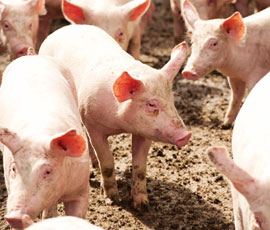Home-grown pulses in pig feed reduce need for soya

Higher levels of home-grown pulses could be included in rations for pigs without significant penalties on growth performance or slaughter measures, new research shows.
The Green Pig project, funded by DEFRA and BPEX, found that larger quantities of peas and faba beans could be included in feed for grower and finisher pigs as a viable alternative to imported soya beans and rising feed prices.
The research shows that the UK could reduce its reliance on soya-bean meal dependency and improve farm sustainability if more home-grown legumes were introduced in pigs’ diets.
Midland Pig Producers, located in Staffordshire, hosted commercial-scale trials as part of the project.
For the trials, three different diet formulations were fed to batches of pigs 35-110kg: control diet (soya-bean meal); pea diet (30% peas, no soya-bean meal); and bean diet (30% beans, no soya-bean meal). Parallel treatments were carried out on slatted and straw-based housing.
Tests resulted in similar pig body-weight gain, feed conversion ratio and back fat depth at slaughter, indicating no detrimental effect of using 30% peas and faba beans in pig diets in the absence of soya-bean meal.
Producers typically include about 5-11% of pulses in pig feed with a maximum inclusion rate of 15%. But the study showed this rate could be increased.
Soya-bean feed, largely imported from Brazil, is currently the major source of protein in pig feed in the UK, at about 70%, and accounting for 30% of feed volume.
But Anna Davis, environment projects manager at Bpex, said the research could lead to a reduced reliance in the UK on imported protein sources, while helping UK farming to become more sustainable as well as reduce its environmental footprint.
Ms Davis said: “We would like to see producers, feed processors and retailers work together to make the findings of this project become a reality.
“Farmers and feed processors might like the idea of using more home-grown pulses in pigs diets, but there also needs to be a demand from the retailer, who may be interested in promoting low-soya pork.”
The PGRO, the UK research and levy body for legumes, is currently studying genetic technologies to improve yields for pulses, which are a notoriously variable.
Steve Belcher, PGRO principal technical officer, said he hoped the results of the project should provide more momentum for pulses instead of soya on protein feed rations.
“We have been delighted with the findings of the project so far, which is due to finish in November,” he said.
“In future years, we expect there will be a push to get more home-grown pulses used in feed.”
